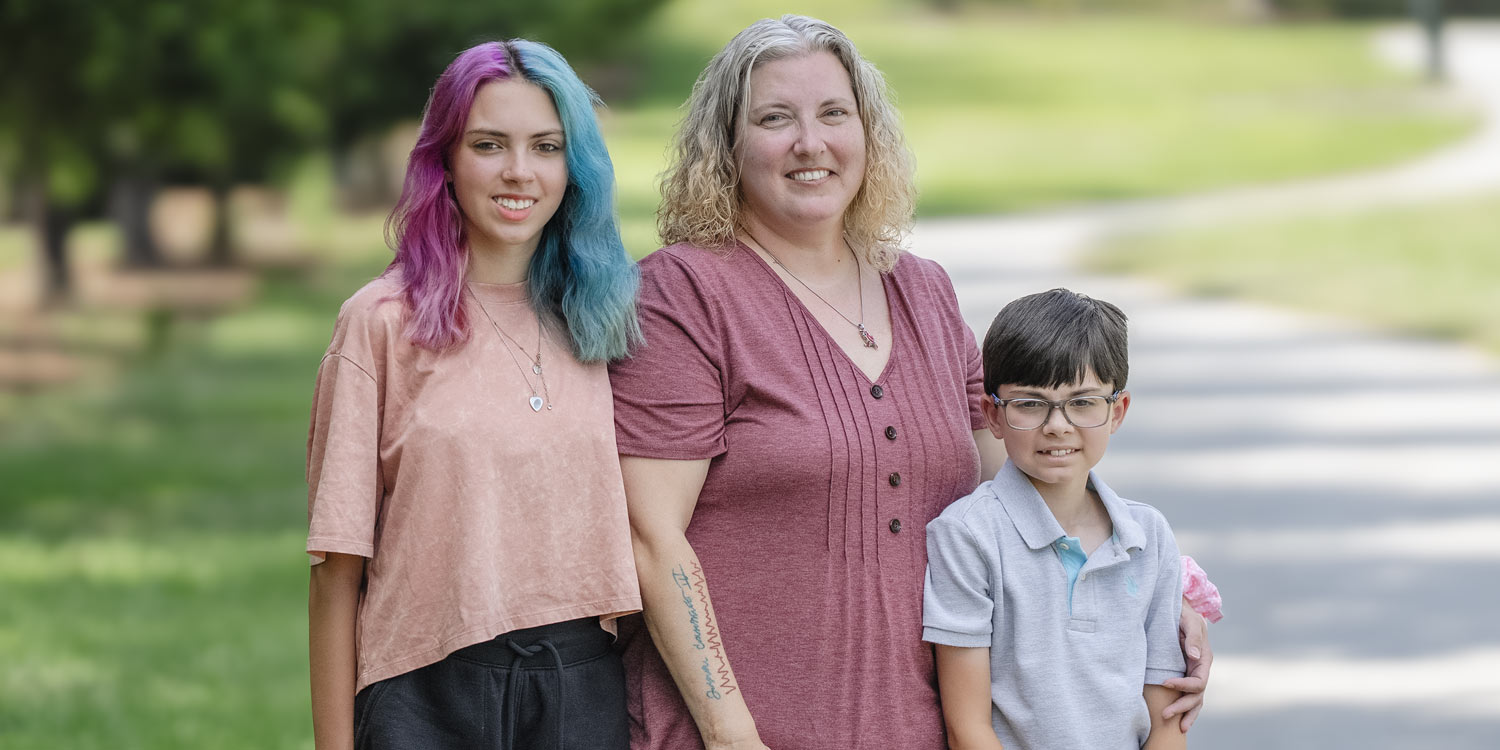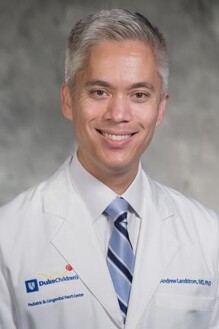Jaymes Morra era un niño pequeño cuando le diagnosticaron taquicardia ventricular polimórfica catecolaminérgica (CPVT), un trastorno genético raro del ritmo del corazón que puede causar paro cardíaco súbito durante el ejercicio. En 2023, se sometió a cirugía avanzada en Duke Health para ayudar a prevenir arritmias peligrosas. Hoy, el CPVT de Jaymes, de nueve años, está bien controlado y juega deportes con sus amigos. "Es un diagnóstico aterrador", dijo Christine Morra, madre de Jaymes. "Pero, por otro lado, hay esperanza..
Un asunto familiar
Las señales eran todo menos obvias. La madre de Jaymes, Christine Morra, tuvo episodios de desmayos, y su hermana mayor, Julia Morra, tuvo convulsiones, pero nadie sospechó de enfermedad cardíaca genética hasta que el hermano mayor de Jaymes, Joey Morra, se desmayó durante la clase de gimnasia en la escuela. Los médicos notaron algo anormal en el ecocardiograma (un ultrasonido del corazón) de Joey. Más pruebas mostraron taquicardia ventricular polimórfica catecolaminérgica (CPVT). "Joey inició la cascada", dijo Christine Morra. Luego se realizó la prueba a Julia, y luego a Jaymes y a mí. Se origina en una mutación espontánea en mí.
Julia, Christina y Jaymes Morra
Una píldora difícil de tragar
La CPVT tiene la reputación de ser mortal, con tasas de fatalidad de hasta el 50% antes de los 30 años sin el tratamiento adecuado. 1 La condición se desencadena cuando la adrenalina inunda el corazón durante la actividad física o el estrés emocional. La CPVT puede permanecer latente durante años o incluso décadas y prácticamente no causar síntomas hasta que ya es demasiado tarde. "La parte más difícil fue el diagnóstico de Jaymes a los tres años", dijo Christine Morra.
Buscando atención experta en Duke
Cuando la familia Morra se mudó de Connecticut a Carolina del Norte en 2020, el sólido Programa de Genética Cardiovascular Pediátrica de Duke Health, que forma parte de una colaboración más amplia en genética cardiovascular de pediátrica y adulto, lo convirtió en la opción obvia para su atención. "Los médicos sabían exactamente a quién debíamos ver en Duke, por lo que pudimos organizarnos allí con bastante rapidez", dijo Christine Morra. Los niños Morra fueron atendidos por el director de genética cardiovascular de Duke Andrew Landstrom, MD, especialista en cardiología pediátrica y especialista en electrofisiología que se especializa en el tratamiento de arritmias pediátricas genéticas raras o "heredables" como la CPVT.
"La CPVT es el síndrome de arritmia más amenazante para la vida que se conoce", dijo el Dr. Landstrom. Incluso con terapias adecuadas, pueden ocurrir paros cardíacos repentinos. Un centro especializado como el nuestro ofrece todas las opciones para tratar esta enfermedad. Además, sabemos el momento adecuado para iniciar las terapias, qué terapias utilizar y empleamos estrategias personalizadas de medicamento que otros cardiólogos podrían no utilizar.
Monitoreo remoto de corazón
En 2021, médicos de Duke insertaron un monitor cardíaco para registrar continuamente el ritmo del corazón de Jaymes. Transmite los datos a equipo de atención de Duke para que puedan identificar rápidamente actividades sospechosas, notificar a la familia y ajustar el plan de tratamiento en consecuencia.
A principios de 2023, Jaymes tuvo una arritmia durante una prueba de taekwondo. Había estado visiblemente nervioso, moviendo las piernas de arriba hacia abajo. Cuando Christine Morra recibió la llamada de Duke, supo exactamente cuándo ocurrió. En lugar de aumentar o cambiar los medicamentos de Jaymes, adelantamos la fecha de su cirugía porque sabíamos que la adrenalina había provocado el episodio.
Cirugía de denervación simpática
La denervación simpática es una cirugía mínimamente invasiva que reduce las peligrosas arritmias al eliminar parte del nervio simpático izquierdo, que libera adrenalina en el corazón. Menos adrenalina al corazón significa menos episodios de arritmia. El especialista en cirugía pediátrica de Duke Ryan Antiel, MD, es uno de los pocos médicos especializados en cirugía pediátrica en el país que realiza habitualmente cirugía de denervación simpática en niños con estas arritmias de alto riesgo.
"Fue agradable que Jaymes se sometiera a cirugía cerca de casa y que el Dr. Landstrom estuviera con nosotros", dijo Christine Morra. La cirugía nos ha brindado algo de consuelo al saber que la adrenalina no llega al corazón tanto como antes.
Ser niño otra vez
Desde la cirugía de Jaymes, ha tenido algunos episodios menores de arritmia, pero no le han impedido jugar béisbol y voleibol, al igual que otros niños de su edad. La Dra. Landstrom enfatizó la importancia de que las personas y las familias con CPVT busquen atención en un centro que esté equipado para tratar estas afecciones cardíacas raras.
"Si es una familia con CPVT, puede llevar una vida normal", dijo. Nuestro objetivo es no solo aliviar el riesgo de muerte súbita, sino también ayudar a que pueda retomar lo que le apasiona.






